![[Metroactive Movies]](/movies/gifs/movies468.gif)
[ Movies Index | Show Times | Silicon Valley | Metroactive Home | Archives ]

Veldt Schmerz: Samuel L. Jackson and Juliette Binoche battle the brutality of South Africa's apartheid villains. Into Africa 'In My Country' is a Boer bore from Boorman SEEKING a redeeming value in In My Country, a movie as wet and dismal as an Oregon Sunday, the viewer might make a stretch and praise the excellent Brendan Gleeson. The Irish actor last teamed with director John Boorman in The General. Looking some 50 pounds lighter since then, Gleeson plays De Jager, a racist torture-master of South Africa. De Jager is so evil he keeps a lair full of poor taxidermed animals who watch Samuel L. Jackson overact with their impassive glass eyes. Why isn't Gleeson as big a star as Jackson? Gleeson is the more interesting of the two in these scenes, holding back everything Jackson spills out. Gleeson triumphs over a script that has so little going on that he's reduced to posing over a desk light, so that his face will be lit from the chin up, the better to give him John Carradine shadows. In My Country concerns the 1994 Truth and Reconciliation Reports that came after the fall of apartheid. A caravan of judges and bishops recorded some 21,000 testimonies about police and paramilitary brutality. It's a subject rich with drama. Unfortunately, the real focus isn't on the disappearances and the tortured; it's on the reaction of outsiders and how their hearts bleed to hear of it. Anna Malan (Juliette Binoche) is an Afrikaner poet who is covering the inquests for the radio; her fruity narration distances the subject further: "I cannot escape it! I cannot defy it, yet, I insist." Since one of the sessions is held in a schoolhouse, she works that irony: "How obediently we sat in school and learned our lesson." Theater audiences may not sit quiet that obediently. Jackson plays a Washington Post reporter named Whitfield, who has a temper about the entire proceedings, but he's particularly pissed at Anne for being a member of the Afrikaner nation. Can't these two kids realize they're crazy about each other? And unfortunately, it is just that simple. Ann Peacock's script is the biggest culprit; it makes Cry Freedom look better with every new scene. Perhaps Jackson is supposed to be Clark Gable—impatient, curt with the ladies. The filmmakers even do that scene where the couple is forced to spend the night in a motel room. Fortunately, a sidekick (Menzi "Ngubs" Ngubane) is there to stall the inevitable. I think of all the times I've heard film directors complain about how critics don't understand what they do. Having got that off their chests, they then go out and make movies like In My Country in the most serious ignorance of how journalism works. Someone should explain that Washington Post writers don't try to strangle a source or go around pronouncing, "White people have a capacity for getting away with murder." At times, it seems as if Boorman is trying to lay on some shading. I think I caught the implication that Anne's privilege has made her a bit twitty. Come to think of it, the finale, with its burst of romantic-poetic renunciation, is all too deliberate. Who thought they could turn the Truth and Reconciliation Committee into the The Bridges of Madison County?
In My Country (R; 104 min.), directed by John Boorman, written by Ann Peacock, based on the book by Antjie Krog, photographed by Seamus Deasy and starring Samuel L. Jackson, Brendan Gleeson and Juliette Binoche, opens Friday at selected theaters.
Send a letter to the editor about this story to letters@metronews.com. [ Silicon Valley | Metroactive Home | Archives ]
|
From the March 16-22, 2005 issue of Metro, Silicon Valley's Weekly Newspaper.
Copyright © Metro Publishing Inc. Metroactive is affiliated with the Boulevards Network.
For more information about the San Jose/Silicon Valley area, visit sanjose.com.